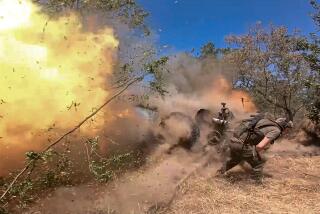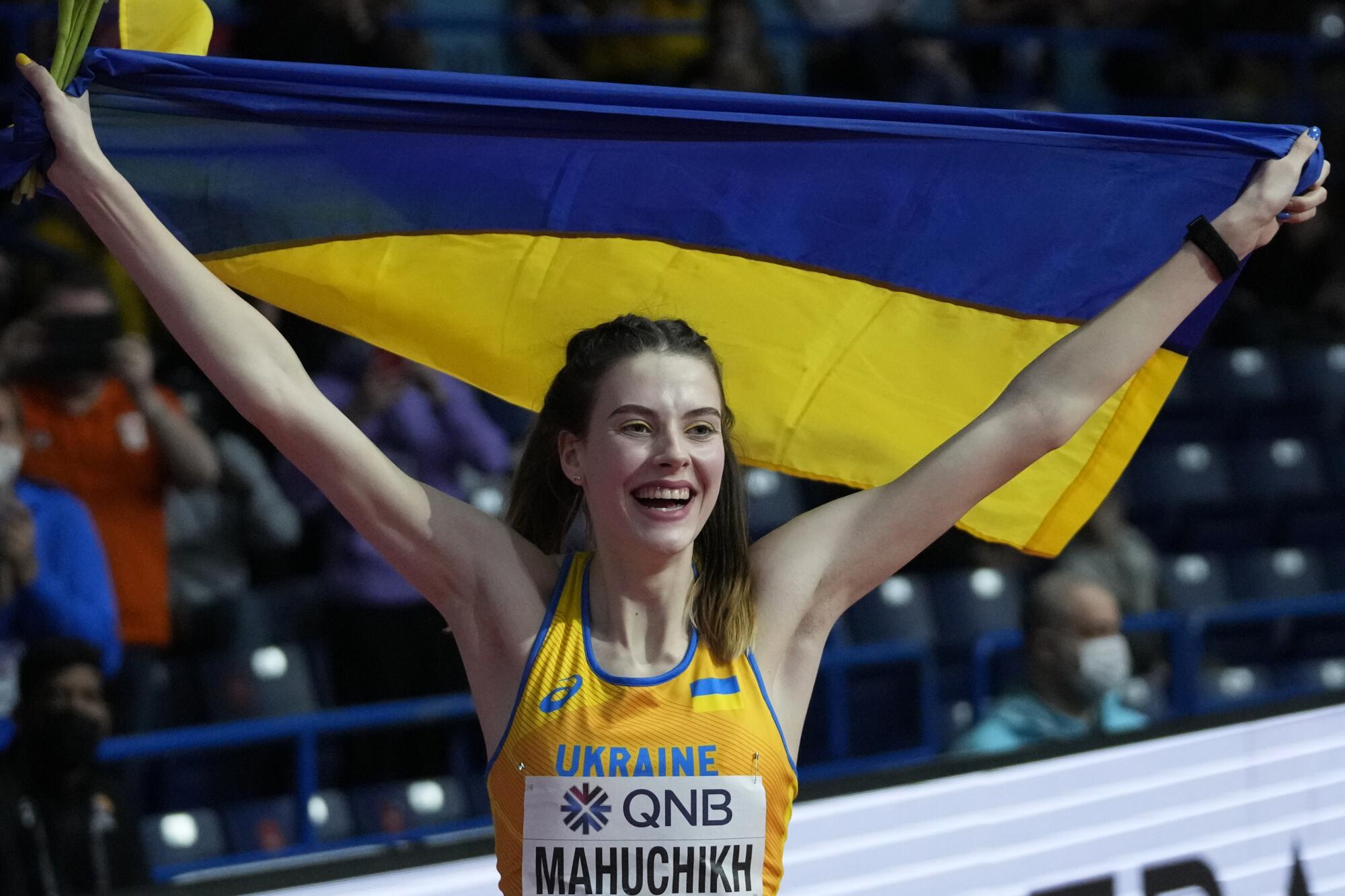
- Share via
The acting president of Ukraine’s track and field federation logged into the Zoom meeting from his olive-green tent near the front lines, the country’s yellow and blue flag in the background.
Yevhen Pronin wore a camouflage T-shirt, several days’ worth of unshaved beard and a tired smile.
Since the Feb. 24 invasion of Russian forces into Ukraine, in deadly hotspots including Bucha and Irpin, Pronin’s nights are spent flying drones to gather reconnaissance on Russian positions, and his days are used to run his other jobs. By 9 a.m., he checks in remotely with his law office. Then the 31-year-old shifts his thoughts to running his country’s largest sports federation.
When he took over in November on an interim basis, supporting the country’s best runners, jumpers and throwers was more straightforward. Since February, Pronin helped arrange evacuations through Europe for 320 track and field athletes, a number that did not include families or coaches.
In March, he addressed a council of European track and field leaders in Munich. Then it was back to the battlefront, this time in the Donbas region of eastern Ukraine, tracking Russian troops that had reconvened and fortified their positions.
“I stay here because I know that we will win this war and everything will be OK,” Pronin said. “The question is the price of this victory.”
It’s a victory Pronin and his compatriots seek on two fronts, both militarily and symbolically. In a wounded country, he and other Ukrainian officials and athletes believe there is power in claiming territory, whether around battered cities or atop a track and field awards podium.
“If we win, if our sportsmen can do the interview, can bring up a flag, it’s a good position,” he said. “... I understand that it will be a big emotional signal for all of the world.”
It’s one Pronin and Ukrainian athletes hope to send again this week when the world’s outdoor track and field championships are held in the United States for the first time. Elite international competitions often attempt to frame themselves as safe spaces from politics, but what the world’s track and field fans see inside of Oregon’s Hayward Field will unmistakably reflect the events still unfolding half a world away.
Russian and Belarusian athletes won’t compete after track’s global governing body, World Athletics, barred them from its competitions indefinitely in March. The organization also has created a fund that has covered some living and training costs of displaced Ukrainian athletes, officials and family.
Ukrainian officials are hoping for a repeat of March, when high jumper Yaroslava Mahuchikh won the world indoor championship. Less than a month after she awoke to the sound of shelling in her hometown of Dnipro, and two weeks after fleeing the country during a three-day, 1,200-mile car ride through Moldova and Romania before arriving in Serbia, Mahuchikh cleared 6 feet, 7½ inches to win the world indoor title. Mahuchikh, who had forgotten her spikes when fleeing Dnipro, celebrated by raising the Ukrainian flag over her head to a standing ovation.
“We must focus for our country,” Mahuchikh said. “We protect our country on the track.”
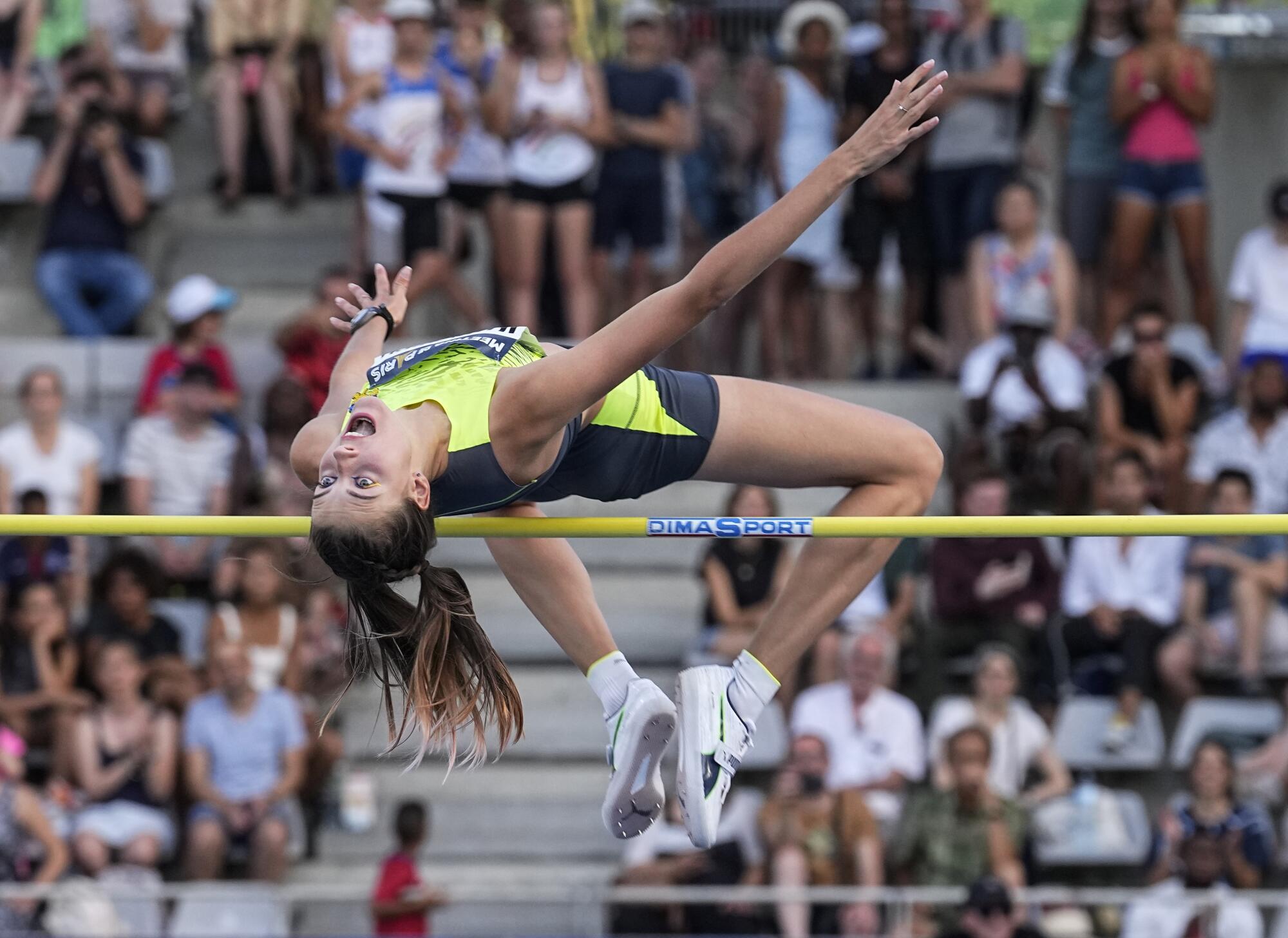
In the early hours of Feb. 24, as Russia began what its government has called a “special military operation,” Pronin went to a bunker and got on the phone.
He called Sebastian Coe, the celebrated former British distance runner and head of World Athletics, and later Dobromir Karamarionov, the president of European Athletics. Pronin had a two-pronged plea: to ask that they cut off Russian athletes from competing internationally, and to withhold future competitions from being held in the country.
By March 1, World Athletics had excluded all athletes and support personnel from Russia and Belarus, which supported the invasion, “for the foreseeable future,” a ban that remains in effect. It also includes Russian athletes who, in recent years, had been allowed to compete internationally under a neutral flag following a doping scandal that left the country ineligible to host World Athletics events.
Coe said barring athletes for the actions of their governments went against his beliefs but called this different because Western businesses and governments had taken measures against the Russian government.
Within days came the International Olympic Committee’s response, which included condemning Russia’s violation of an “Olympic Truce” and recommending its federations move competitions out of Russia and Belarus while banning athletes and officials of those countries from competing internationally. In a first, the IOC withdrew the honorific “Olympic Orders” once awarded to Russian President Vladimir Putin. The IOC has earmarked $7.5 million in aid to Ukrainian athletes.
Yet some responses frustrated Ukrainian athletes and officials. Pronin said he didn’t understand why it had taken several days after the invasion for a forceful statement to be issued by Sergey Bubka, the Luhansk-born pole vault icon turned president of the country’s national Olympic committee. Bubka’s organization has since helped coordinate the relocation of more than 3,000 athletes and coaches outside of Ukraine, according to the Olympic committee.
Pronin remains angered that the measures IOC president Thomas Bach called “protective measures — not sanctions” did not remove Russian influence from the Olympics’ powerful governing body.
Russian IOC members, including Yelena Isinbayeva, who won Olympic and world championship gold medals in the pole vault and has served as an officer in the Russian army, have been allowed to continue to participate in business matters, a decision Bach has defended despite calls for their removal.
“According to international rule of law, sanctions can and should only be imposed on those who are responsible for something,” Bach said in a May speech. “This war has not been started by the Russian people, the Russian athletes, the Russian Olympic Committee or the IOC members in Russia.”
Bach added that “there is no justice if you paint everyone with the same brush.”
As one of the country’s most decorated track and field athletes before being elected in 2019 to Ukraine’s parliament as a member of President Volodymyr Zelensky’s party, and now holding high-ranking posts within the country’s sports governing bodies, Olha Saladukha is no stranger to diplomacy. Though “grateful” for many of the IOC’s decisions, she added she was “surprised to hear the words of the IOC leadership that it is not necessary to exclude Russians from the IOC on the grounds of citizenship but to approach the principle — of whether these people are guilty of military aggression,” she said.
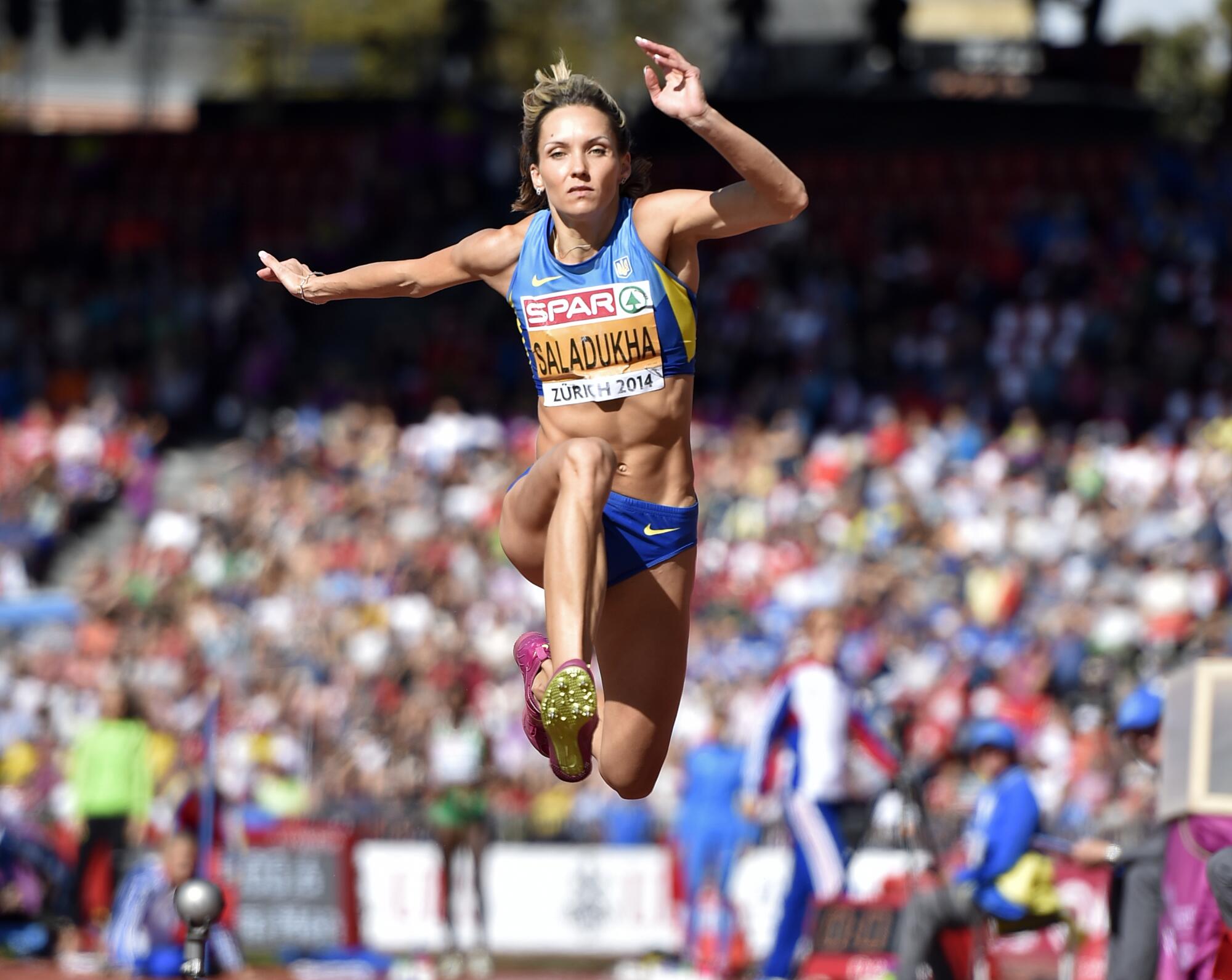
“This is a very dangerous position because it allows leaving in the governing bodies of world sports representatives of the state, which destroys all world principles,” Saladukha said in responses translated by a Ukrainian athletics official. “And such people promote Russian interests. There is no sport in Russia that is not controlled by the state — there is an element of aggressive propaganda.”
Athletes have described wide-reaching support. Ukrainian high jumper Bogdan Bondarenko said friends had been hosted for months by the family of Italian high jumper Gianmarco Tamberi, who shared the gold medal at the Tokyo Olympics. Australian high jumper Eleanor Patterson won silver to Mahuchikh in March while wearing fingernails painted in Ukrainian blue and yellow.
Vashti Cunningham, a star American high jumper, says she prefers to keep her distance from opponents to maintain a competitive edge. Yet before May’s Prefontaine Classic in Oregon, she said she went to a grocery store and created a gift basket for competitor Iryna Gerashchenko. Before arriving in Eugene, Ukraine’s contingent of 37 athletes and coaches spent nearly two weeks training in Chula Vista.
In private conversations, some Russian athletes have expressed sympathy, apologized and asked to help, Saladukha and Bondarenko said, while also acknowledging the athletes could not say so publicly, fearing state reprisal.
“I still don’t know what to say [to] them or how to look into their eyes,” wrote Russian Maria Lasitskene, the Olympic high jump champion in Tokyo, of her Ukrainian competitors in a June open letter to Bach, criticizing the ban on her country’s athletes. “They and their friends and relatives are experiencing what no one human being should ever have to feel.”
What “hurts,” Saladukha said, is that such a sentiment has not been universal. Amid the blast of supportive statements, Ukrainian athletes and officials have taken note of what they say has been missing.
“I’ve gotten messages from athletes from the aggressor country,” Bondarenko said. “They wrote that they were disappointed in my position and that their country had come to save me. From whom? But first, they were interested in why they are banned and cannot compete in international competitions.”
It “shocked” Mahuchikh when her social media posts condemning the invasion drew pushback from Russian athletes.
“Now in Ukraine the people die and the children die and to say, ‘It’s not us, it’s not us,’ it was terrible,” Mahuchikh said.
“People, our generation, states never forgive the Russians for their silence,” she added.
Bondarenko called Mahuchikh’s gold medal “significant” toward projecting national strength, but as she joined a growing diaspora with little chance of a quick return home, the catharsis from Mahuchikh’s Belgrade celebration faded. The United Nations High Commissioner for Refugees has conservatively estimated that 5.6 million Ukrainians have fled across Europe.
Accustomed to life on the road, and with access to financial support and medical care from sponsors and governing bodies, elite athletes can tap into networks others fleeing Ukraine do not have.
They also acknowledge such circumstances cannot push away feelings of dislocation from, or fear for, those still in Ukraine. For every day that training is a respite, there is a rush of uncertainty for when they can return and what will await them. Pronin said that fighting had damaged or destroyed approximately 10 track and field facilities. Across all sports facilities in Ukraine, 16 have been destroyed and 85 damaged, according to the country’s Olympic committee.
“They seem to be doing OK,” said Cunningham, who won the U.S. high jump title last month and will compete at the world championships. “But it’s like, we also just don’t know what it’s like to sit here and have our country being … like, ravaged, right now. So it’s hard for me to put my mind where theirs is.”
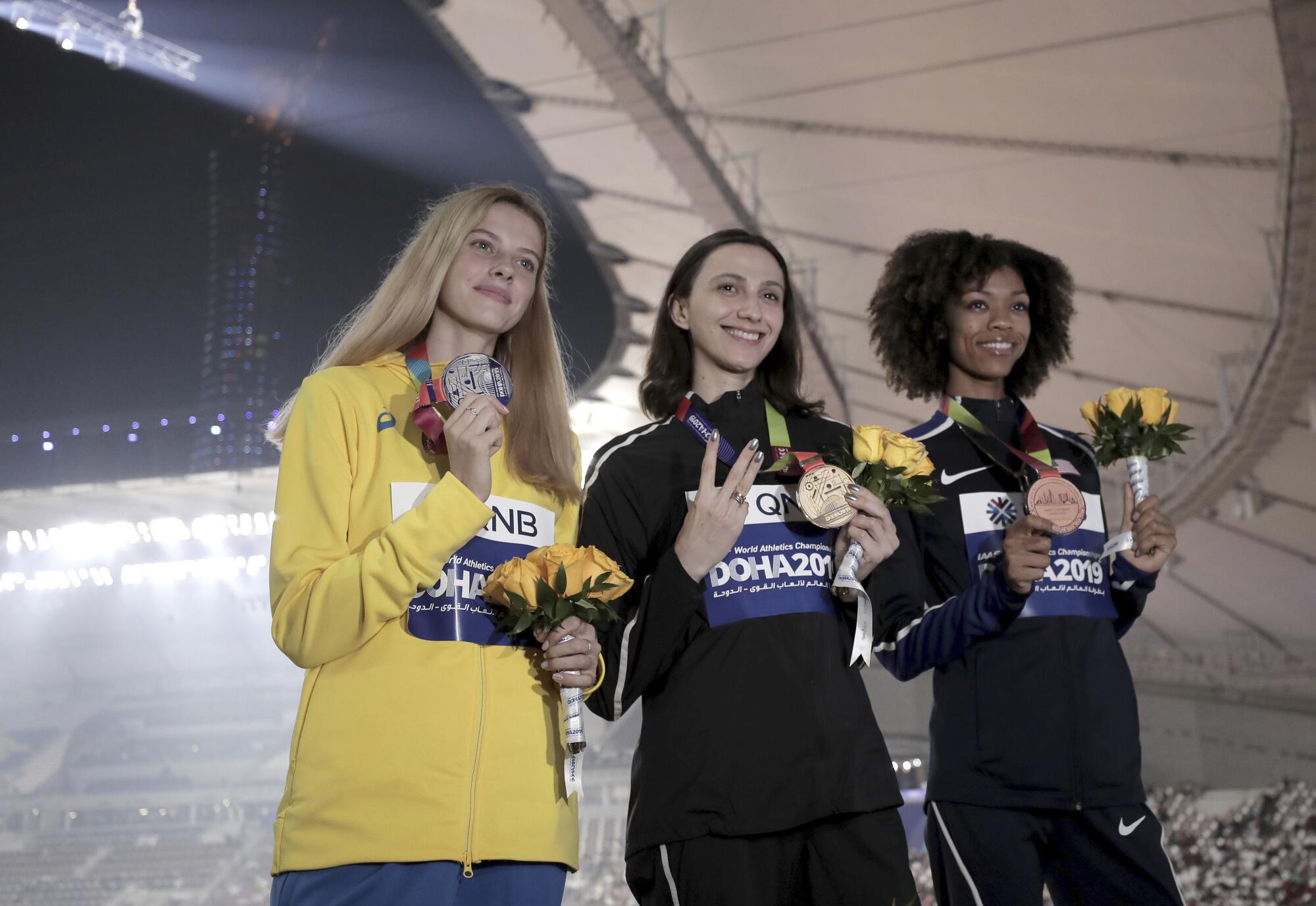
Said Mahuchikh: “It’s very difficult now because when I come here in Eugene, I read this news and think, ‘Oh my god, again, again, shelling, again, the people dying.’ And with my coach she say, ‘We must forget.’ It’s difficult for us, forget [during] competition because we must jump, we must show results, but it’s too difficult, really.”
In early spring, Mahuchikh traveled to Germany, where she reconvened with her boyfriend and received assistance at the headquarters of her sponsor, Puma, then trained in Turkey for two months. By mid-May, as she prepared to compete in the Prefontaine Classic, alongside fellow Ukrainians Gerashchenko and Yulia Levchenko, Mahuchikh described herself as mentally exhausted.
For some, finding tunnel vision amid national crisis is an intensely familiar position.
Saladukha’s European outdoor championship in the triple jump in August 2014 came four months after Russia’s annexation of Crimea. At the same time, Russian-backed Ukraine separatists contested control over the eastern industrial region of Donetsk, near the Russian border, where she grew up.
“Then I’d already understood that I would not be able to return to my native Donetsk after the competition,” she said. “I had a heavy heart — all thoughts were about Ukraine, home, and people. But we gathered our strength and won because we understood how important it is for everyone.”
Among the problems Pronin and his colleagues faced in the invasion’s early days was finishing paperwork to evacuate hundreds of athletes, many of whom were men of military age. Pronin said he knew of five track and field athletes who elected to fight and had been killed, and claimed at least one had been captured in the battered port city of Mariupol before being taken to Russia. During Bach’s July 4 visit to Kyiv, Zelensky said 89 athletes and coaches had been killed, and 13 others had been captured.
Bondarenko, a 32-year-old former world champion high jumper and Olympic bronze medalist, was training in Italy and anticipating an afternoon flight from Rome to Kyiv on Feb. 24 when he was awoken by a friend’s phone call informing him of the invasion. Bondarenko, who grew up in Kharkiv, one of the first cities bombarded by Russian forces, at first thought it was a twisted joke.
“But when I called my wife, who said she heard the explosions, my world turned upside down,” Bondarenko said in response to questions interpreted by Ukrainian officials. “I was shocked because of their words.”
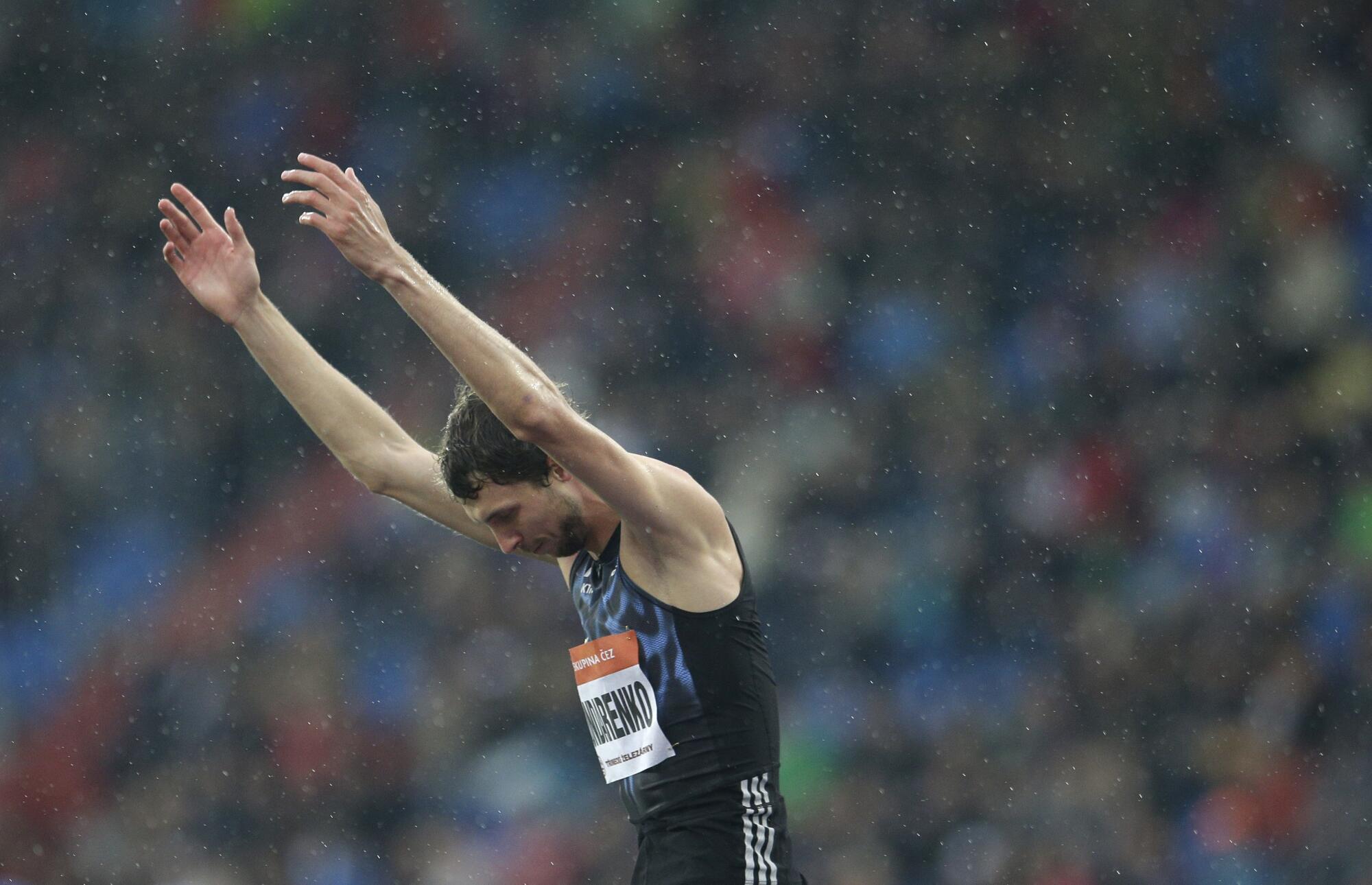
Some of his family has fled Ukraine while others remain in Kharkiv. The way he could help most, he said, was donating to the Ukrainian army, coordinating evacuations while attempting to generate exposure through competing and speaking to reporters regarding the “truth about the situation and today’s reality of Ukraine.”
“That’s why today I do my job,” Bondarenko said. “But my emergency bag is packed, and if necessary, and it will be my turn. I’m ready to come to Ukraine and defend it.”
Pronin is still there, his social media page filled with photos from the front lines. In May, as evening fell and drone missions above the Donbas approached, Pronin said he hoped to attend Eugene’s world championships in his capacity as Ukrainian track and field’s acting president. Discussions with Polish counterparts had left him optimistic that Poland might hold Ukraine’s national championship meet, originally scheduled for June, in September.
First come the world championships. Ukrainians will be watching for victory, Saladukha said.
“This would mean that Ukrainian sport lives and that we have a future,” she said. “We have to win wherever we can.”
More to Read
Go beyond the scoreboard
Get the latest on L.A.'s teams in the daily Sports Report newsletter.
You may occasionally receive promotional content from the Los Angeles Times.



